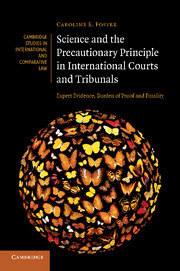 Science and the Precautionary Principle in International Courts and Tribunals
Science and the Precautionary Principle in International Courts and Tribunals Book contents
- Frontmatter
- Contents
- Preface
- Acknowledgements
- Part I Context and theory
- Part II Expert evidence
- Part III Burden of proof
- 5 Getting to the heart of the rules on burden of proof
- 6 Reversing the burden of proof to give effect to the precautionary principle
- Part IV The finality of adjudication
- Bibliography
- Index
- References
5 - Getting to the heart of the rules on burden of proof
Published online by Cambridge University Press: 11 April 2011
- Frontmatter
- Contents
- Preface
- Acknowledgements
- Part I Context and theory
- Part II Expert evidence
- Part III Burden of proof
- 5 Getting to the heart of the rules on burden of proof
- 6 Reversing the burden of proof to give effect to the precautionary principle
- Part IV The finality of adjudication
- Bibliography
- Index
- References
Summary
The exercise of the international adjudicatory function in disputes involving scientific uncertainty may meet its greatest test in relation to the allocation of the burden of proof. The traditional rule on the burden of proof has the potential to provide a high degree of predictability in international adjudication, yet there may arise cases where fairness calls strongly for an international court to reassess or adjust the allocation of the burden of proof. This may especially be so in the light of the precautionary principle. This chapter investigates the origins and the logic of the rule on burden of proof, establishing its parameters and the desirable directions for its future development. Chapter 6 then explores the potential for a modification in the articulation or application of the existing rules on burden of proof, in order to permit the reversal of the burden of proof to give effect to the precautionary principle.
The rule on the allocation of the burden of proof that is applied in international courts and tribunals is that the party making an assertion must prove that assertion: actori incumbit probatio. The rule derives from the rule applying in civil trials in Roman law: ei incumbit probatio qui dicit non qui negat. According to the maxim reus in exceptione fit actor, a party relying on an exception in the substantive law will attract the burden of proving the applicability of the exception or defence. Thus, as Rosenne has written:
Generally, in application of the principle actori incumbit probatio the Court will formally require the party putting forward a claim or a particular contention to establish the elements of fact and of law on which the decision in its favour might be given.
- Type
- Chapter
- Information
- Science and the Precautionary Principle in International Courts and TribunalsExpert Evidence, Burden of Proof and Finality, pp. 185 - 239Publisher: Cambridge University PressPrint publication year: 2011


